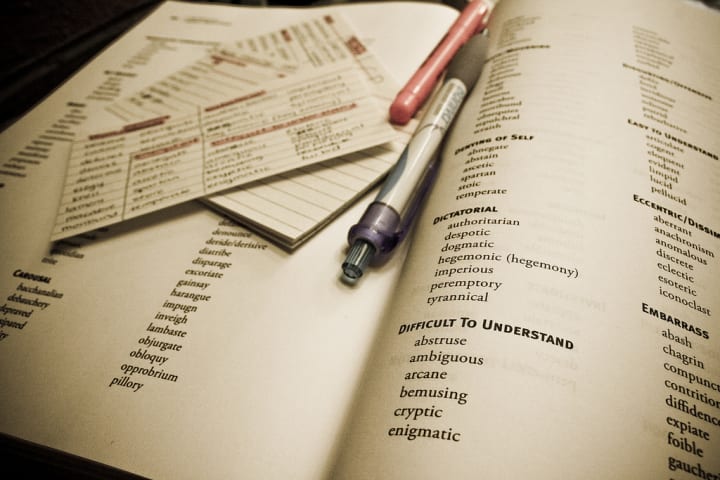Tips to Increase Your IELTS Vocabulary Score
Time to learn a new trick or two, so you can boost your exam score!

Are you getting ready to take the IELTS exam? The International English Language Testing System (IELTS) is used to measure "the language proficiency of people who want to study or work where English is used as a language of communication."
IELTS is scored using a "band" scale, ranking the least proficient language users with a score of one and the more proficient, or expert users, with a score of nine.
The exam comes in versions: Academic and General Training. The Academic IELTS is for those who wish to apply to study in the United Kingdom, Canada, or Australia (it is also accepted by numerous institutions in the United States).
The General Training IELTS exam is for people who are trying to migrate to the previously-listed countries or want to apply for training or work opportunities.
Both exams measure the test takers on their proficiency in passive English skills such as listening and reading, and in productive skills such as writing and speaking. No matter which version of the test you are planning to take, you can be sure of two things: 1) as the IELTS website states, IELTS "treats all test takers with the utmost fairness and respect by actively avoiding cultural bias," and 2) this is a HARD test!
One area many tests struggle with is vocabulary memorization. So, if you are worried about remembering tons of vocabulary for your upcoming IELTS exam, here are some strategies and tips to help increase your IELTS vocabulary score!
Learn prefixes and suffixes.
Consider "co-"
Most, not all, but most words beginning with the co- prefix pertain to an object or verb involving two or more persons somehow. Here are several examples:
- coerce (to convince someone else)
- conspire (to plot with someone else)
- couple (two persons; a pair)
- coexist (to live with another)
- cooperate (to get along with someone else)
Learning to spot key prefixes and suffixes will automatically give you an edge in learning bulk amounts of vocabulary for your IELTS exam!
For more, check out the Cambridge Dictionary!
Synonyms and Antonyms
While you’re learning new words, take the time to learn words with the same and the opposite meanings, too.
A thesaurus is tool of choice for this, and nearly all word processing software comes with a built-in thesaurus. I’m typing this using Microsoft Word Starter; I will look up the word "tool" using the thesaurus now…hang on!
Wow, the results are in for synonyms... words that mean the same thing: "instrument," "implement," "device," "means," "utensil," "apparatus," "contrivance," and "gizmo." All these words are synonyms for the word "tool."
These seem to be in order of relevance, so let’s select the first word, "instrument," and see some synonyms for that, because it will offer even more options: "gadget," "appliance," "mechanism," "contraption."
"Tool" isn’t a word with many antonyms, however. Antonyms are words which mean the opposite of another word, for example: "hot"–"cold," "short"–"tall," "black"–"white," etc.
Learning opposite words is extremely helpful, not just for your IELTS but in general practice. Imagine knowing the word "left" but not knowing "right!"
Mnemonic Tricks

Long before technological gadgets served to augment our memories, we just had to remember everything. How? One method—mnemonics, the trick used by the world’s Memory Champions.
Here’s the basics, by way of story: I couldn’t remember the Turkish words "left" and "right," I always got them confused. One night, in the back of a taxi, my friend needed to tell the driver to turn left. He put his hand over his heart, and said, "sogul" in Turkish, which is pronounced like ‘soul.’ His trick? He told me, “I just remember the phrase ‘heart and soul. Your heart’s on the left. ‘Sogul’ is left.”
OK, here’s another one. I also mixed up fork and spoon in Turkish. Spoon is "kasik," which is pronounced like "cash-ick." So I thought of the image of a spoonful of cash, and that bizarre image has stuck. Of course, these were tricks for me to learn Turkish... You are trying to learn English, so check out the Mnemonic Dictionary for more tips!
Group words into clusters.

Creative Commons image
A longer version of this concept is to form mnemonic links via song. For example, I took the poem "Up At the Picadillio," (actually, I used the Barney the Dinosaur version, "The Coachman,"—a very catchy and rhythmic kid’s song) and replaced the words with the Turkish words for the months of the year.
Now I never forget those words, either! Even children learn the English alphabet through the classic "ABC Song," which has a nice little motivational ending:"Now I know my ABC's/next time won't you sing with me?"
Learning short lists of words works very well with this method. So if you're having a hard time remembers the months of the year, for example, just find a song you can link the words to: January, February, March/April, May, and June!/July, August, September.../October, November, December...!
Flash Cards

Creative Commons image
Language teachers and learning platforms are well aware of the power of flash cards.
For cards (even online "cards," like those found at Quizlet.com), the most effective method is to take all the cards you know and set them in one pile, then focus on the cards you don’t know by heart. Review them over and over, and when you feel you’ve learned one, set it aside in a new pile.
This keeps you focused on an ever-shrinking set of cards. Eventually, you should have a pile of cards you are sure you know, cards you are pretty certain you know, and cards you didn’t learn yet.
Once you’ve moved all your "cards you didn’t learn yet" over to the "cards you are pretty certain you know," review them one more time. Keep the newly-learned pile separate from the ones you are "sure you know." It’s a waste of time to review words that are embedded.
But look at the "cards you are pretty certain you know" pile the next day, then the next week, and as you grow more confident in how well you know them, you can shift them to the "sure" pile.
Recordings

Creative Common image
As easy as it sounds! Record yourself, using your phone voice recorder app, laptop, whatever you prefer. Say the new IELTS vocabulary words, talk about them, use them in a sentence. In this way, you are engaging two methods of learning simultaneously—you are producing the words through speaking them, and you are listening to the words as you speak them.
Once they are recorded, you can listen to them when you like, and, if no one is around to stare at you, go ahead and repeat them aloud!
Best of luck on your IELTS exam. We hope this article gave you a few new tips to study!
This article originally appeared in MadEnglishLab.com.
About the Creator
Matt Cates
Freelance writer and owner of Cates Content and Copywriting; retired Air Force Veteran; former administrative assistant at Oregon State University; author of Haveck: The First Transhuman, the greatest sci-fi novel in the multiverse.
Enjoyed the story? Support the Creator.
Subscribe for free to receive all their stories in your feed. You could also pledge your support or give them a one-off tip, letting them know you appreciate their work.






Comments
There are no comments for this story
Be the first to respond and start the conversation.